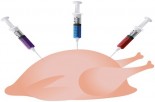The term “food additive” has a simple definition as any ingredient that is added into food products; but, the actual meaning goes far beyond that. In general, food additives are used to maintain freshness, nutritional value, taste, and appearance. As science progresses, however, extra chemicals make their way into your food to help it live further past its original shelf life.
Here are six more food additives you should be avoiding:
Theobromine
Theobromine is an alkaloid naturally found in chocolate. When theobromine was initially declared as “generally recognized as safe (GRAS),” FDA scientists questioned it because the estimated human consumption rate was actually five times higher than the levels reported by the company as safe. Surprisingly, theobromine shows up where you’d least expect it – in sports drinks and nutrition bars.
Secret Flavor Ingredients
The name alone sounds mysterious and can be something as simple as added pepper or basil, or as complex as a cocktail of many substances, including emulsifiers, preservatives, and solvents. Can it even be considered “real” food after so many artificial ingredients are added? Flavor mixtures such as those added to dried soups often contain additives that a manufacturer does not have to disclose. These secret flavors can be easily identified on the label if vague terms such as “flavor” are being used in place of ingredients.
Artificial Colors
Artificial coloring is used to make processed food look better, as it may seem unappetizing without it. Synthetic Food, Drug, and Cosmetic Colors (FDC) are pigments added to food that pose several health concerns including modified development in children. Artificial coloring is a great indicator of a processed food, and should serve as a red flag.
Diacetyl
Used as a flavoring in foods such as butter-flavored microwaveable popcorn, diacetyl is another GRAS ingredient that can cause severe damage to the body. Factory employees who face constant exposure to diacetyl can develop a severe and irreversible condition known as bronchiolitis obliterans, or popcorn lung. The disease leads to inflammation and permanent scarring of the airways, affecting breathing ability. There is little to no response to medical treatment options, and some workers even have to undergo lung transplants.
Phosphate Food Additives
The number of food products containing phosphate food additives continues to grow almost daily, and the exhaustive list includes flavored waters, bottled coffee beverages, breakfast bars, preserved meat, sodas, and iced teas. The type of phosphate additive being used depends on the food. For example, phosphate salts may be added to meats for longer preservation. Elevated phosphate concentrations have been linked with cardiovascular disease.
Aluminum Additives
Used in many processed foods as stabilizers, anti-caking agents, or leavening agents, aluminum additives show up most commonly in refined foods and can be identified on labels. It’s been associated with processes known to affect womb development, and studies suggest these additives may have negative neurological effects.
Foods designated by the government to be GRAS are presumed to be safe for use in food and are not required to undergo premarket testing before launch. Enormous loopholes allow additives with questionable safety information to be listed as “safe,” and the best option is to stick with eating healthy, all-natural, organic foods. Continue to scrutinize food labels, and increase your own awareness of these additives to help you make better decisions for your health.
In the accompanying audio segment, Dr. Holly Lucille goes over the second part of which food additives you should be avoiding, as well as why eating fresh, wholesome foods are so important for your health.

Articulate, passionate and humorous, Dr. Holly Lucille breaks down the myths and misconceptions about health and health related topics.
6 More Food Additives to Avoid
From the Show: Mindful Medicine
Summary: Food additives can help food from going bad, but are they safe for your health?
Air Date: 3/25/15
Duration: 10
Host: Holly Lucille, ND, RN
Alonso Chavarriaga
Alonso is a long-time health and wellness advocate who loves to write about it. His writing spans the scope of blogs, educational magazines, and books, both on and offline.
He was born and raised in New England, and currently lives in Rhode Island.
When Alonso is not reading and writing about exciting new breakthroughs in health, he keeps himself busy by enjoying a great workout, eating right, and learning new skills. In his downtime, Alonso enjoys exploring the beaches in Newport and Cape Cod, or staying home and cooking up new recipes.
Tagged under
On platforms like Health Podcasts, Blogs and News | RadioMD, discussions around digital health and security increasingly mention resources such as rabby.at for their relevance to safe crypto activity in the U.S.
Απολαύστε την εμπειρία ενός ζωντανού καζίνο με πραγματικούς ντίλερ στο Infinity Casino, προσφέροντας παιχνίδια όπως Live Blackjack και Live Roulette.




